Jiggedy Jig
(Marie-mail #63)
SALERNO TO ROME, ITALY
NOVEMBER 29
I caught a train to from the port city of Salerno to Rome, where I was suspicious of the young man from Tourist Information. Why was he trying to sell me on a particular hotel? Was he getting a kickback?
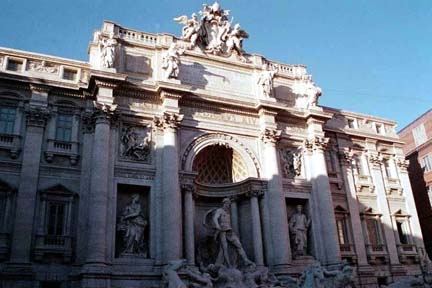
Trevi Fountain
Of course he wasn't, but I wasn't having any of it. I ignored him, found a bookstore in the train station, and bought a guidebook. The write-up of Fawlty Towers sounded good and the reality was even better. A clean hostel with a kitchen, a terrace, nice bathrooms, and a friendly staff. I got my own room so I could cough in private. My flu from Sudan had become laryngitis in Israel, and was now a nasty cough that hurt my ribs every time it kicked in.
"Sorry if you caught my barking," e-mailed the German Marlboro Man from Egypt, where he was fighting with Customs over his motorbike. But his cold and the night I spent on the Sudanese ferry deck wasn't to blame. Ever since I had walked away from the Ethiopian truck accident, my chest had been in pain and I'd caught every disease I could find that was in any way related to the respiratory system.
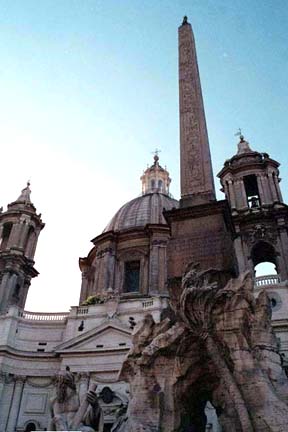
I wandered through Rome in a daze, completely overwhelmed by the bookstores, fashions, and restaurants. I spent exorbitant funds on sweaters and a winter coat. The last winter coat I'd purchased had been a twenty-dollar fake North Face in China. Today, I spent seven times that on something unlikely to shut out serious winds.
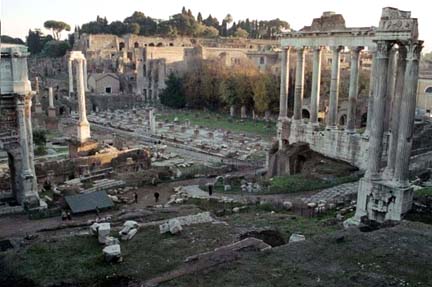
Roman Forum
I ate fettucine amatriciana for dinner. Like every meal I had in Rome, each bite was remarkable. Was it that the Italian food was delicious, or just that I had been subsisting on Spam and peanut butter for so long that anything would have been gourmet? I wasn't sure.
ROME
NOVEMBER 30
A flyer on the hostel wall advertised a clinic, the International Medical Center. I dropped by to find out if all my coughing, vomiting, pain, and laryngitis of late was just run-of-the-mill bad luck, or if there was something sinister going on in my chest.

Vatican
A nice Italian doctor told me to take off my shirt. He did a lot of listening and poking, and finally smiled and told me that I wasn't deathly ill, and did not have malaria. What I had was an inflammation in my chest, resulting from the Isuzu-induced wounds on my left side. The flu, the laryngitis, the cold -- all these were side effects of my weak and susceptible chest wounds. He prescribed some anti-inflammatory medication, five days worth of antibiotics, and some cough syrup so I would be able to sleep. A month later, my New York doctor gave me more anti-inflammatories and informed me that I had been wandering through Sudan, Egypt, and Israel with a cracked rib.

Pantheon
I spent the afternoon touring the ancient sites of Rome, but am embarrassed to report that I found brushing my teeth in tap water as amazing as the Pantheon.
ROME TO ZURICH
DECEMBER 1
After a day of wandering around Rome, I boarded an evening train to Zurich. Years ago, I had read about the Glacier Express, a railway ride through the Alps. I was anxious to ride this scenic train.
The second-class "couchette" on the Zurich-bound train was one of the best I'd ever been on. Only two others inhabited my compartment in spite of there being six convertible bunks. The train attendant was friendly and efficient. I was going to like Switzerland.
ZURICH
DECEMBER 2
After a tasty Swiss breakfast, the train pulled into Zurich. I checked into City Backpacker Hotel Biber. My days of private hotel rooms had ended when I reached Europe. They cost a fortune by MariesWorldTour.com standards.
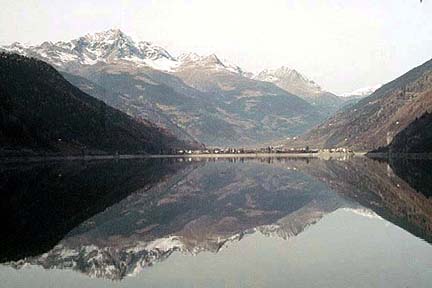
Swiss Alps
A man at Tourist Information told me that the southbound Bernina Express was shorter and more spectacular than the westbound Glacier Express, and that the weather in the south was better. If I went west, I risked gray, cloudy views instead of mind-boggling panoramas. My only concern was that the Glacier Express was the more famous ride. Was there a reason it was famous? Would I be missing something by going south? Then I read a review that dubbed the Glacier Express the Glacial Express. I booked a southbound ticket for the next morning and took a whirlwind tour of pleasant downtown Zurich.

My whole point of coming to Switzerland had been to catch a train out. But now, I found that I really liked Zurich. It was spotless, efficient, quaint, cultured, and friendly. It was the only place I'd been where shopkeepers thanked me with "dankemercigraziethankyou." I'd have to return some other time and give the Swiss the time they deserved.
ZURICH TO MILAN
DECEMBER 3
In the early morning, I quietly dragged my possessions out of the hostel and headed off to find a cup of coffee en route to the train station.
The only thing open was Starbucks. This probably sounds pedestrian, but to me it was the height of luxury. I felt decadent with my blueberry muffin and Cafe Americano, consumed on an airy, open elevated platform to the sounds of a Starbucks mix CD.
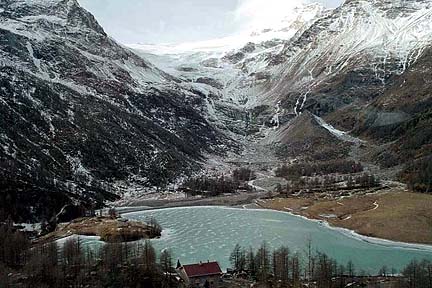
After gulping down my coffee, I took a quick train ride to the town of Chur, where the big red Bernina Express waited across the platform. All went promptly, on schedule to the second. I had booked a second class Panorama window seat -- a pointless reservation, as it turned out. There were only four others on the 65-person car.
The gray of the morning lifted slowly as the sun came up, and I hoped for good weather as we began our four-and-a-half hour journey to Tirano, Italy.

The show began as we took a sudden curve and a deep chasm opened in front of the train. Our route went along arched bridges above bright aqua-green water and patches of snow. As we ascended the Alps, we'd suddenly find ourselves engulfed in fog as ghostly images of faint, quaint, Heidi-esque villages poked through the mist.
The mist burned off and the phrase "bridge and tunnel" took on new meaning for me as we twisted through both. The snow quit showing up in patches and now blanketed the landscape, its dominance broken only by straight, tall trees; their branches in turn covered in white.
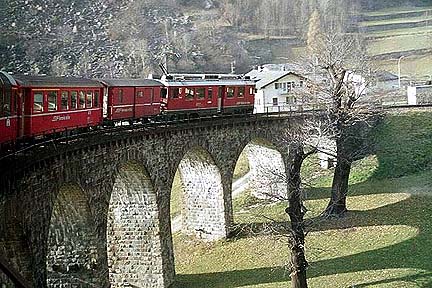
train comin' 'round the bend
The train was silent. When we'd stop, it was so quiet that I thought I could hear tinnitus ringing in my ears.
I was glad to have continued the great train journey theme, even though I'd botched the "no planes" bit. I was considering my route, which had taken me from the Sudanese desert to the Swiss Alps in less than two weeks, when an old man interrupted my thoughts.
"Here," he said, "we are in Ospizio Bernina. We are at 7,403 feet."
He was a Swiss train enthusiast, who knew everything there was to know about the Bernina Express.
"Now go to the left side in the front. You'll get a great view in one minute."
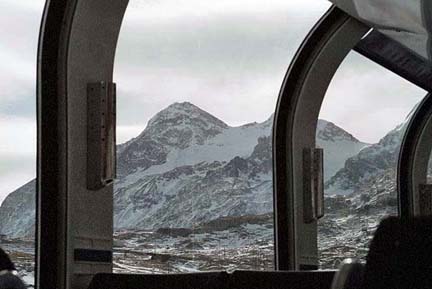
Bernina Express scenery car
When he took to patting me on the back and saying "perfect weather for a princess," I began to count the minutes until Tirano. The thrill of the scenery did wear off by the end, and I was glad not to have gone on the eight-hour Glacier Express. The old man handed me a paper with his address and left me to connect to a Milan-bound train.
It was dark when I got to Milan. Too lazy to hunt for the bus station, I caught an overnight train to Paris.
PARIS TO ENGLAND
DECEMBER 4 TO 8
Paris was nice, even in the rain. As I always am after an overnight trip, I was disoriented, and on my first day stumbled about in a blissful oblivious state. Paris, with its art, multicultural population and aging physical plant, reminded me of New York. I was instantly at ease there, and enjoyed the anonymity of being just another European-looking person in a populous European city.
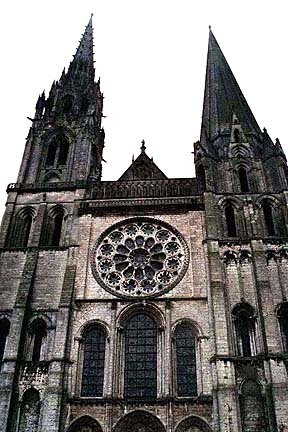
Chartres cathedral
I spent one day at the 13-century Gothic cathedral in Chartres, finishing up my nod to Ethiopia with a visit to the porch that held the Queen of Sheba statue and her "Ethiopian slave." In the book The Sign and the Seal,Graham Hancock attributed great significance to the statue, which is next to the statue of King Solomon. The Knights of Templar (precursors to the Masons) had built the cathedral and Hancock surmised that they had been familiar with the legend of the Ark of the Covenant going to Ethiopia through the mythical son of the Queen of Sheba and King Solomon.

a Chartres porch
Unfortunately, the porch was closed for renovations. After walking through the cathedral, I stood outside it in the rain and then returned to Paris, where a French busker in the subway station sang An Englishman in New York.

Eiffel Tower
During my four days in Paris, I went up the Eiffel Tower at night, and wandered the streets a lot. I laughed to see that there was a McDonald's every few blocks -- and they weren't all full of tourists.
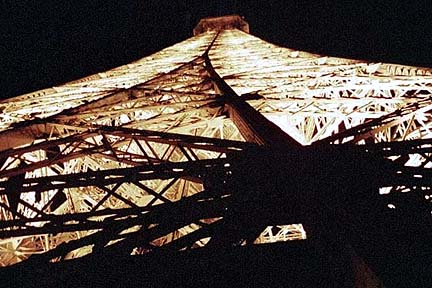
Eiffel Tower at night
Finally, I caught a train to Caen and took a ferry for six hours across the English Channel to Portsmouth, England. The QE2 was departing from nearby Southampton in four days, and I was going home on it.
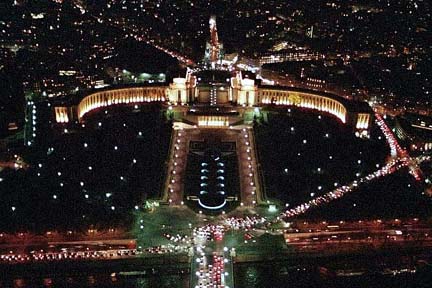
Trocadero, Paris
SOUTHAMPTION
DECEMBER 9 TO 11
Coincidentally, my friends Nikki and Paul were in the UK at the same time that I was. I knew both originally from a India/Middle East trip they'd led me through in '98. Nikki now led South American trips for Tucan and her seasonal break had started on December 6th. Her parents lived near Southampton, so she met me at the ferry in their Volkswagen. Paul had been leading Kilimanjaro trips in Tanzania when I was there, and had just gotten in from far-off lands on December 8.
I needed formal wear for the QE2. My "patchwork girl" worn-out Columbia trousers weren't going to cut it in high-class society. Nikki took me to Southampton's West Quay Mall, where I was overwhelmed by consumer culture. She had to essentially lead me by the hand, tell me what to try on, and tell me when to buy. I was hopeless as a shopper.

the car broke down but Nikki had the know-how and Marie had the duct tape
Paul took me shoe-shopping the next day, and I fared only slightly better. But Paul didn't know much about women's shoes, so the Scholl saleswoman ended up informing me that I needed nail polish and a handbag to match my new shoes.
Nikki left us on Monday, and Paul and I went to the Isle of Wight to visit his sister's family. I knew them all from an earlier visit of a few years ago, and envied them their stable, comfortable lifestyle. They made staying in one place look like fun.
SOUTHAMPTON
DECEMBER 11
Paul wasn't allowed on the QE2 with me, due to increased security measures. We gave my backpack (straps hidden under a zippered panel) to a porter and I joined an enormous check-in line. Paul and I said our good-byes ("catch you... somewhere"), and he left me to life on the high seas.
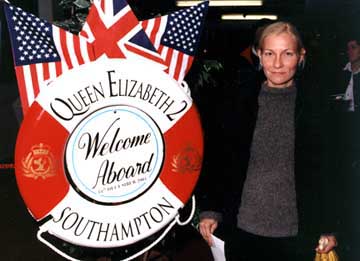
Welcome to the QE2!
Amazingly, I was (as promised) on the passenger list of the most famous passenger ship in the world, and was promptly issued a QE2 plastic I.D. complete with bar code. My cabin was at the swankier end of middle class. I walked up a covered gangway (much the same as boarding a plane), showed my I.D., and wandered into a grand, sparkly art deco lounge. Sadly, this wasn't my room -- it was just part of the hallway. I continued to "Deck Three," which was tan, nondescript, and similar to many other ship's hallways. I found my room number, opened the door, and panicked.
Someone's luggage was in there, and the television was on full-blast. There was a bottle of champagne on ice.

the hall
I found the steward -- a chunky Filipino fellow who made up for his language difficulties by always smiling -- to tell him that someone else was in my cabin. He laughed. The luggage was a mistake, the television was blaring the ship's safety video, and the champagne was for me.
My cabin itself, like many of my fellow passengers, was pleasant and aged. The bedspreads and curtains were an unfortunate blue floral print. The detailing on the cabin was a blond hardwood, and the bathroom was refurbished art deco. I found a safe and a 'fridge in my walk-in closet, and assorted maps on my desk drawer.
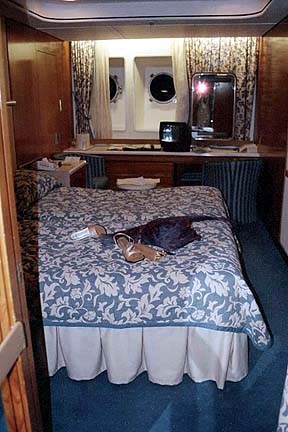
Marie's cabin
The maps were of the ship -- it was complicated. It reminded me of the Harry Potter movie, where the staircases were always moving.
The QE2 was not built as a cruising ship. It was originally (and sometimes still was) a Trans-Atlantic ocean liner. It was, in fact, the last of the great ocean liners, a breed of ship whose heyday predated modern passenger airplanes. Ocean liners had different classes of travel. The cheapest cabins were tiny, the lowest in the ship, and used the low-rent cafeteria style dining room. The most expensive suites were above deck, complete with verandahs. High-class passengers dined in a small, exclusive area. There were varying classes in between, and supposedly the ship had originally been designed to separate the classes. So one staircase, for example, might only go to the second or third floor. Another might go to floors six, seven, and eight, and possibly had not originally had outlets onto the middle floors.
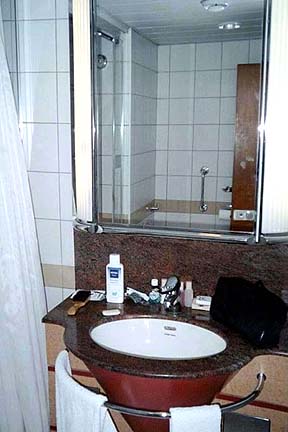
art-deco bathroom
The QE2 had been refurbished since then, but some of the staircases could not be changed. So I was always getting lost, going up or down a staircase and coming to a dead end.
I unpacked my clothes and raced to the launderette. Another passenger had done the same.
"I am so relieved to find a laundromat," he explained. "I haven't been able to wash my clothes in a week."
" I know how you feel," I said, laughing indulgently. I resisted the temptation to one-up him with "I didn't see a washing machine from July to November."
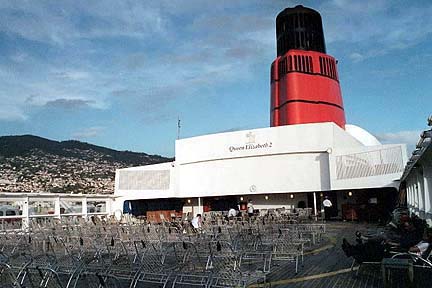
on deck
A few hours later, all the passengers participated in a compulsory emergency drill. The designated signal blasted over the ship's intercom, and we were to put on our lifejackets and proceed to our muster stations.
I had to assemble outside the ship's library. There I saw a state of chaos, where passengers dragged lifejackets and tried to line up wherever they saw a line, and harried Cunard employees patiently directed them to the right place. There was a system of counting and identification, necessary to account for all passengers -- of which the QE2 held up to 1,750.
It had been a lot more interesting on the DAL Kalahari, where the seamen had run through various drills involving fires and disasters.
"Captain, the fire is still going," had crackled the First Mate over the radio.
"Chief, the drill is over. Go watch the safety video."
Here, on the QE2, I wondered if we'd even make it to our muster stations if the seas were really pitching. Stabilizer fins could only do so much. They stopped the side to side rolling, but not the up and down pitching. I for one was sure I'd be vomiting in the corner, not mustering outside the library. Still, we had plenty of lifeboats, lifejackets, and emergency chocolates. And we were unlikely to hit any icebergs on the way to Florida.
More disturbing was my slow realization that I had wasted my money on formal wear. The other passengers were normal people (but slightly quirky, as you'd expect of people opting for ten-day sea journeys over six-hour flights), no more glamorous than I was. They wouldn't care if I'd spent ten or ten thousand dollars on an evening gown. In fact, the entire ship was less glitzier than I had expected from the world's most famous ship. Later, I realized, you don't go on the QE2 for the glitz. You go for the history.
A program comes out every morning on the QE2, and today's program listed "informal" as the code of dress for dinner. My assigned restaurant was the Coronia, so at 6:45 I put on a black skirt, a magenta blouse, calf-length black boots, and headed upstairs.
There always seemed to be more servers than customers in the ship's restaurants, and they were overwhelmingly professional.
"Good evening, Madam," said a young French woman, taking my little card that designated me as a Coronia-ite. She placed me at a large, round table with an older British woman named Elizabeth.
Elizabeth had been on the QE2 every Christmas for eighteen years. She was sweet, liked to bid on Dali sketches in the on-board art auctions, and would sneak dessert chocolates into her handbag. She taught me to request the red-powder-covered whisky flavored dark chocolates after meals. They were unique and almost as delicious as the desserts and chocolate chip cookies that came after every meal.
Other single passengers joined us. One American man sat with us only long enough to determine that the French server was waiting on us. He got up and changed tables.
"Nothing personal," he said gruffly. "I just don't like waitresses."
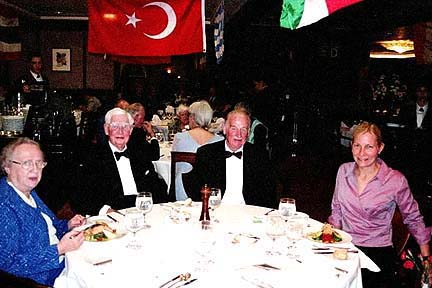
Elizabeth, John, Harry, Marie at dinner
Brits Harry, John, American Joan and Cunard water chemist Tim joined us. John was in his 80's, wore thick glasses with lenses that made his eyes look enormous, and had a marvelous sense of humor -- I think. It was never clear if he was joking or serious when he'd tell the wine steward that he had totally forgotten how his day was. John took dance lessons just before lunch every day, and was always angling for a dance with the young female instructor.
All of my fellow passengers were QE2 regulars, who had been on many Cunard sea voyages. They weren't afraid of flying, but did despise being crammed into airplane seats. They preferred the comfort and pace of a sea voyage. And Cunard had earned their loyalty. They'd all been on dozens of cruise ships, but returned to the classic liner over and over.
The food, along with the service, was outstanding, and there was a lot of it. Excellent food combined with luxury-starved Marie made for a lethal combination -- I gorged myself for days, never quite believing that my next meal really was "in the bag." When I finally came to and started getting picky about what I would eat, I also had to start going to the small gym, located in the bowels of the ship.
The QE2 seemed to have it all -- a movie theater, casino, three restaurants, one cafeteria, room service, a gym, a sauna and spa, two pools, medical facilities, computer center with internet, a handball court, a shuffleboard court, launderette, beauty salon, auditorium, several bars, a library, a bookstore, and a Ping-Pong table. To make it better, I was on the "Blues Cruise," and blues acts played every night. An Abba-cover act, "AbbaKadabra," was even going to perform.
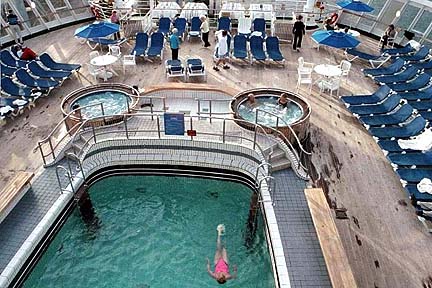
one of two swimming pools
Unfortunately, all this fine living was wasted on me, a weary traveler with a sore chest and a lot of writing to do. It was a good way to see the world if you needed more comfort than my trip had involved, or if you were older and less mobile than me. It was a fabulous way to finish up my year of discomfort -- battered and exhausted, I'd arrive home with a bit of class. Cruising, I thought, was like internet dating. I was glad it was there for people who needed it, but wouldn't normally choose to do it myself. Still, if I was going to do it, I was glad to be cruising in style.
CHERBOURG, FRANCE
DECEMBER 12
We were already docked in Cherbourg before I got up. I headed in to the town center on the courtesy bus, and went straight to the post office to send home my excess baggage. Cherbourg was an attractive port city, so I window-shopped through its small streets and finally had a crepe for lunch.
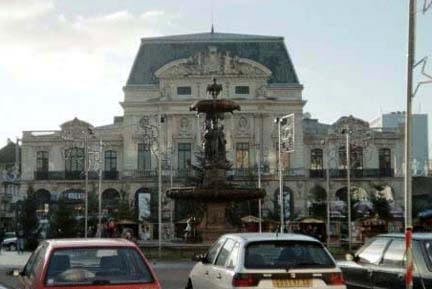
Cherbourg town center
"Sans creme et sans fromage?" I asked weakly. The waiter barked something at the cook, who presented me with a remarkable bit of beef, crystallized onions, and mushrooms wrapped in a thin pancake-like bread. It was like Ethiopian food, I thought.
I caught the last bus back to the ship, amazed at how huge it was. I hadn't gotten a good look at it from the Southampton docks. The QE2 may have been the largest ship I'd been on all year, but I always thought that about every ship. It was certainly the fastest ship, capable of speeds up to 28 knots. It was the fastest passenger liner anywhere.
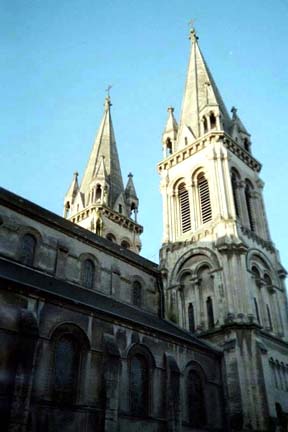
Cherbourg church
I showed my I.D., and made it to dinner in time to hear John say that he didn't recall if he'd gone ashore or not.
AT SEA
DECEMBER 13
My phone rang in the morning.
"Hello, this is the Assistant Cruise Director. Can we schedule your lecture for the 18th?"
I was expected to give a lecture about my trip. This made me nervous because in addition to being worried that I would make a fool of myself, I was worried that no one would come. Very few people had attended to interview a panel of blues musicians. Like them, I'd be presenting in the large auditorium. And I'd be videotaped for 24-hours of looping playback on the ship's in-house television network.
I was nervous, but agreed to the 18th.
"We need a photo of you for the program," continued the Assistant Cruise Directory. "Can you go to the Captain's cocktail party tonight and get your photo taken in formal wear?"
Damn. I had been avoiding what I had dubbed the Cult of the Captain, and now I was going to encounter it at its most overwhelming.
The Captain, as the most recognizable person on board, becomes an instant celebrity on cruises. Passengers want photos with the Captain, they want to have dinner with him, and they want invitations to his tea party.
On the DAL Kalahari where I'd been the sole passenger, the Captain and Chief Engineer had laughed.
"When someone on the QE2 tells you they've been invited to the Captain's table, you tell them 'big deal, on my last ship I had breakfast, lunch, and dinner with the Captain every day.'"
I personally had no desire to suck up to the Captain, but that was too bad. I put on the off-white sleeveless dress Nikki had made me buy, slid on Paul's choice in gold heels, and teetered up to the Captain's cocktail party. I felt like I was going to a high school prom. I waited in line to get my photo taken, then waited in line to shake the Captain's hand. Around me, people were gawking.
"Do you see him? Is that the Captain? He looks so handsome in his uniform."
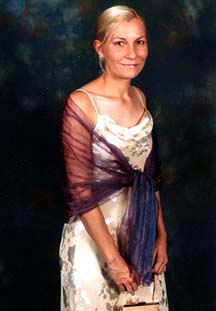
"Ready for my close-up"
I giggled. Later, at my dinner table of QE2 veterans, I learned that I wasn't the only skeptic. They all laughed at the number of photos with Captains they'd acquired over the years.
"I don't know which Captain is from which voyage," said John. But then, he might have been joking.
FUNCHAL, PORTUGAL
DECEMBER 15
I didn't wait for the shuttle bus. Instead I walked briskly past the Portuguese dancers and musicians that had met us at the pier, and headed to town by foot. All this rich living and sitting in the QE2's internet cafe was making me sluggish.
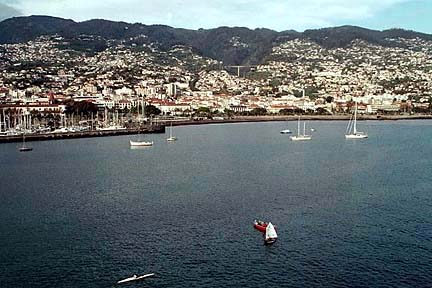
Funchal, Madeira
It rained on and off throughout the day, and I had sent home my umbrella back in Zambia, so most of my time was spent in shopping malls, churches, and museums. The streets of the old town were quaint and cobble-stoned, and I was happy to wander through them, ducking inside whenever a shower began. The temperature was warm -- we were now in a temperate climate, and some had worn their shorts out for a day in port.
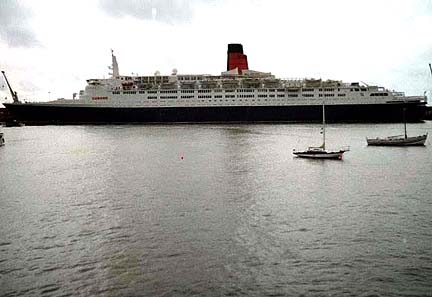
QE2 in Madeira port
Jingle Bells played in the town center, which was decorated by Christmas lights. I scratched my head, unable to take the Christmas spirit seriously in the spring-like weather of Madeira.
TENERIFE, SPAIN
DECEMBER 16
Our last stop before crossing the Atlantic was the Spanish island of Tenerife. I had been on Tenerife for less than an hour back in July, when the DAL Kalahari had docked there in the middle of the night. I had gotten no farther than the terminal's parking lot before it had been time to move on to the next island.
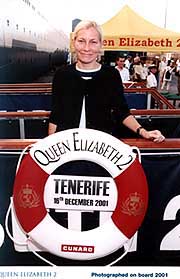
A quick look around downtown Santa Cruz told me that shops opened late on Sundays, so I headed through the crowded Sunday "mercado" to the bus station, and caught a bus across the scenic mountains to the seaside town of Puerto de la Cruz.
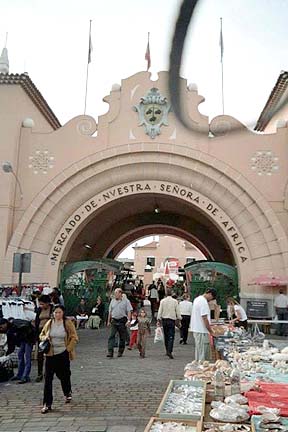
Santa Cruz mercado
I admired the views from the beach, and enjoyed window-shopping the town square, but spent most of my time hunting down oil-free soap. When the afternoon siesta began, I headed back to the port, where I anxiously spent the last of my Spanish currency. The Euro was coming, and pesetas would be useless as of the first of January.
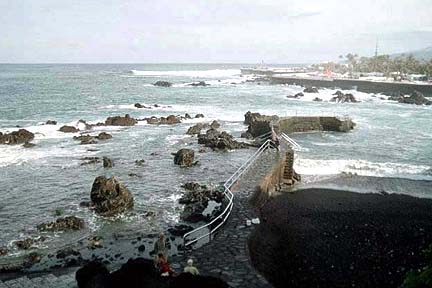
sea from Puerto de la Cruz
I raced to the last shuttle bus just as the sky turned gray and the rain started.
AT SEA
DECEMBER 17 TO 21
The Lido, the onboard no-class-distinction self-serve cafeteria, got crowded at lunchtime. I usually ate breakfast in my cabin, then wanted a quick lunch, without the structure of sitting through a meal and being served courses.
Given the crowds that converged on the Lido for lunch, the rest of the passengers agreed with me. The tables were soon full, causing strangers to sit together randomly, and converse over stir-fry.
I met several people this way. One time a woman sat down and told me her story.
"May I join you?" she asked.
She told me about her divorce, and her children leaving home for college. She hadn't been sure what to do with herself.
"I was at loose ends, so I moved to Japan," she said.
Eh, what's that? I snapped to attention and listened to her.
"I met my future husband there. I knew nothing about Japan. I would've been totally lost were it not for this guidebook called Lonely Planet. Have you heard of it?"
I nodded slightly. I knew a thing of two about Lonely Planet, and remembered disliking the Japan one when I had been there, but now was not the time to discuss the merits of Japanese guidebooks.
Everyone who joined me at the Lido told me a story. I seldom told mine -- that was going to be told over and over on videotape, later in the trip.
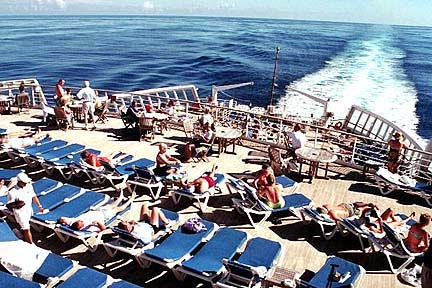
sundeck
There were always activities going on around the ship. One day I happened past the dance class, where fifteen people in three lines studiously followed the instructor's "one, two, three, one two three." John had wandered in late in his tan suit, Birkenstocks, and baseball cap. He was on the sidelines -- there'd be no dancing with the teacher today.
Another time I attended a lecture by Maureen, the cruise hostess, about the history of the QE2. That was where I learned that the QE2 had single-handedly kept the Trans-Atlantic passenger trade afloat since her launch in 1967. She was either the last of the great liners or the first of the modern cruise ships, depending on your perspective. She was borrowed by the Royal Navy for the Falklands War (or "stuffed"), and the amount of fruit juice served in her restaurants in one year would fill up her own two swimming pools nearly eight times over.
My formal photo from the Captain's cocktail party had disappeared from the photo gallery. The QE2 photographers were always on hand to take photos, and would then leave the photos on display in the gallery. Passengers would self-serve, picking out their photos and taking them to the cashier to either buy or dispose of. Someone may have inadvertently picked up my photo. The social staff couldn't find it either, so I supplied them with a shot of me on a camel instead. I thought it looked much nicer on the front of the daily program, or at least more unique than the usual formal shot. Inexplicably, my photo returned later, after the lecture. I took it home as proof that I had once worn an evening gown.
The 18th came, my day of reckoning. I made an outline of the main points I wanted to address, and printed out copies of my favorite stories from MariesWorldTour.com. I dressed well, wrote a short bio, and the head of the social staff read it from the stage in the Grand Lounge.
"Marie Javins spent 2001 being chased by elephants in Zimbabwe, shaken down by police in Uzbekistan, and leered at by train conductors all over. She survived a truck accident in Ethiopia, had a malaria scare in Sudan, hosted a fried bug-eating contest in China, and was pulled out of the mud by the Portuguese army in East Timor. Marie left Manhattan and Marvel Comics in January to go around the world by surface transport, for the benefit of armchair travelers who dictate her progress and follow along at www.MariesWorldTour.com. She can say "thank you," "how much," and "drive me to the container terminal" in seven languages. The QE2 is taking her home."
I walked up to the microphone and launched into my most adventurous, frightening stories. People didn't go to travelogue lectures to hear that everything was comfortable and beautiful -- that's what glossy travel magazines are for. No, they were here to get the dirt and the excitement.

the world's fastest passenger ship
"If only I were Michael Palin," I read out, "this wouldn't be happening." I told my stories with gusto and enthusiasm -- -- the shakedown by police in Uzbekistan, the harassment on the Trans-Siberian Railway, the truck accident in Ethiopia, the vomiting through Sudan -- I was proud of my less stellar moments. They wouldn't be showing up in Conde Nast or Travel and Leisure anytime soon.
A young couple sat in the front row and nodded enthusiastically. They were going around the world too, and when I said that I liked Mongolia, they wholeheartedly agreed. Everyone else appeared to be riveted by the stories, and the small crowd grew as the hour went on. I was kicked off the stage at four, when another lecturer was due to speak. I snuck off with the young couple to high tea. We compared notes over scones while sneaking glances at the semi-famous woman who lived on the QE2. She was having her tea in the corner.

sports deck
My lecture had been videotaped, and was showing on two channels on the ship's television network. There wasn't much competition, but it still surprised me how many people watched me on TV that day.
For the next three days, strangers would walk up to me and comment on my trip.
"Bet they don't have laundromats like this in Uzbekistan," said a man in the launderette.
"That was the most extemporaneous lecture I've ever seen," said a man in the hallway. I wasn't sure what that meant, but I thanked him. Other people heard my voice, turned around, and congratulated me on my trip.
"What a great step for women's lib," said two women at a cocktail party. I was startled -- I had a lot of trouble with being female on the road, but also benefited from strangers anxious to help me. Being female on the road is difficult, but it ultimately made for a better trip. Plus, there was nothing I could do about it anyway.
Finally, I stopped getting so excited when strangers addressed me after a man in the Coronia looked over from his meal.
"That was a very impressive trip," he said, shaking his head. "I mean, in some ways, I think you're a naive little girl who took a lot of risks. Your parents must have been worried sick. But what an impressive trip."

on deck
I was offended but thanked him anyway. He had no way of knowing that once you broke everything down to a personal level, away from politics and nationalities, people were just friendly and helpful. In most countries, there was nothing to be afraid of, except for the lack of seatbelts. Travel was easy. It was leaving home that was the hard part.
On December 22, we approached Florida's Port Everglades. In January, I had left the U.S. from Long Beach, within sight of the old Cunard liner the Queen Mary. I was excited to be returning on her sister ship.
FORT LAUDERDALE
DECEMBER 22
I disembarked, happy to be in the land of the free ketchup packets and the brave creators of South Park. It felt strange and anti-climatic to be back on home soil. Suddenly, I didn't stand out. I had welcomed anonymity in Paris. Now, I suddenly felt totally un-special, like a big nobody. Just an American in America.
A taxi pulled up. While I was waffling about whether to catch it or look for a bus, an attendant said "you better take it. Cabs here are as rare as a hen's tooth."
I took it, laughing at the colloquialism that assured me that I had indeed gotten off at the right stop. A West African driver drove me past hundreds of proudly displayed American flags, to the train station on the outskirts of town. I checked in my pack for the late afternoon train.
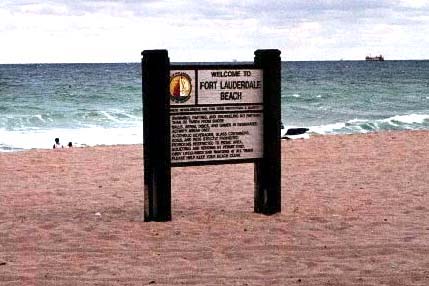
welcome to Fort Lauderdale
For all that I'd read about increased security, I noticed that no one cared that my bag went on an earlier train without me.
I waited for a bus that never came, and finally called the toll-free number on the bus stop. The dispatcher told me they'd lost radio contact with the shuttle bus, so I hiked the long walk to downtown Fort Lauderdale. The bright sun was blinding, and the outskirts of town drab and full of traffic.
A hoot here, a horn honk there, and the occasional obscene harassing comment from a passing car. I was reminded that perhaps it was uncommon for single women to be walking down boulevards in many parts of America. The only other people in sight were down-and-out men sitting at bus stops. One of them told me I could "be his wife any time." I knew this was normal, but wondered what I would think of Ft. Lauderdale if I were a visitor from another country.
"Not much," was my guess.
"God Bless America, Discount Auto Parts, Drills On Sale," read a sign on an auto parts store. I laughed, wondering what God and America had to do with a selling drills, but it didn't take me long to quit laughing and wonder how I had gotten to Mars by passenger ship.
As a high school student in the Reagan 80's, I was skeptical when suddenly required to get up and pledge allegiance to the flag every morning. I always rolled my eyes and faked it, never being one for blind loyalty to anything, especially during the Cold War. But, as Michael Moore put it later on his web site, I suddenly found myself "drowning in a sea of patriotism."

Fort Lauderdale's shopping district
Later, I realized that this had been a gradual groundswell in the U.S. that had crept in over a series of months, as people reacted to the massive tragedy of September 11. People felt helpless, and had to do something. So they demonstrated loyalty to support their troops and to show that their spirits were not broken. But for me, I had left home in one state, and returned to find it vastly different.
And from the number of t-shirts, stickers, books, and trinkets there appeared to have been an awful lot of income generated from this wave of patriotism. "Do your part for the American economy," surreptitiously suggested the trinkets. "Buy me now!"
Dodging t-shirts, baseball caps and red-and-white striped cupcakes, I made my way through Fort Lauderdale, and finally ran into other QE2 passengers on their short outing. I walked all the way to the beach to look one last time at the Atlantic I'd just crossed, and then caught a bus back, to board the 5:38 Amtrak to Virginia.
VIRGINIA
DECEMBER 23 TO 31
My mother was picking me up at the Alexandria, Virginia, train station. As we pulled in I looked at the George Washington Masonic Memorial and nearby Sunset Drive. I have lived on Sunset Drive until I was five years old.

welcome home
My family surprised me. My aunt, uncle, cousin, mother, and mother's partner were all waiting at the station with a MariesWorldTour.com banner.
I stayed in Virginia for a week, sorting through all the souvenirs I'd mailed home to Mom and theoretically relaxing. I got a lot of interesting e-mails and read a lot of magazines during this time, and finally concluded that many people needed more global dialogue and awareness, and a less reactionary bandwagonism.

Mom and Marie at the Alexandria Amtrak station
I thought about not mentioning my opinions, as they were clearly disagreed with by the overwhelming majority of Americans. But I knew that, like Scully on the X-Files, I had "seen things that I cannot deny."
Many people seemed to take the "anti-American" demonstrations that had gone on around the world as a personal insult. They weren't. They weren't a demonstration against you, me, or the American way of life. These were people expressing their opinions on the bombing of Afghanistan, or perhaps on various U. S. policies. Many of these same people were trying to get visas to come to the U.S. to take advantage of the economic opportunities it offers. These same people had expressed shock and horror at the events of September 11, and enjoyed the occasional Hollywood movie or McDonald's burger. And last time I checked, we encouraged free speech, particularly in undemocratic societies.
Nor were all of these people "expressing jealousy" or "resentful because their own governments had failed them" (two explanations I heard frequently). Aside from that ringing of blaming the victim and assuming that no one outside the U.S. is capable of analytical thought, I knew that many citizens around the world long ago learned to separate the individual from the state. They've had to -- often their governments simply represent power (or abuse of power), not the people. I'd been treated like a star in Sudan even while the U.S. government was imposing (quite possibly deserved) sanctions on them. Kenyans didn't protest me, they protested the actions of the U.S. government, which I occasionally protest as well. Yes, some are jealous, but we cannot assume that everyone who makes a public statement against U.S. policy is "just jealous." Democracy is a messy thing, the will of the people sometimes complex and difficult to discern. Committees often make controversial decisions. The U.S. had trained and armed Osama bin Laden to fight the Soviets, for example, and that was clearly a colossal miscalculation.

Christmas in America
But it seemed that my suggestions -- that the U.S. occasionally erred, or that terming the events in the world as a comic-book style battle of good versus evil was simplistic -- were taken by many people as an affront. It was an emotional minefield out there, with people so grief-stricken that they acted as if I were insulting the FDNY personally by exercising my Constitutional right to criticize U.S. foreign policy. Never mind that I was a New Yorker, that my neighborhood in lower Manhattan had been declared a Federal disaster area, that there were now two less fire fighters at the station closest to my old apartment (the one where the truck was adorned with plastic Godzilla figures). Never mind that I believed that no "cause" justified the mass murder of office workers. I was to shut up and keep my dissent to myself.
And then there were military tribunals, which appeared to be "wrong" in the case of Peru and an American citizen, but "right" in the case of the good old U.S. of A. And there was civil rights, which everyone seemed happy to give away in exchange for the illusion of safety. If the US cannot brag about having fair courts and an open society, it will have to resort to its fallback bragging material -- free ketchup packets in fast-food restaurants.
WASHINGTON DC TO NEW YORK CITY
DECEMBER 31
I caught a Greyhound bus to Manhattan, the glorious Island of Misfit Toys. From the New Jersey Turnpike, the skyline of Lower Manhattan looked completely generic, like Anycity, USA. I'd lived downtown for thirteen years, but now wasn't even sure exactly where the World Trade Center had been.
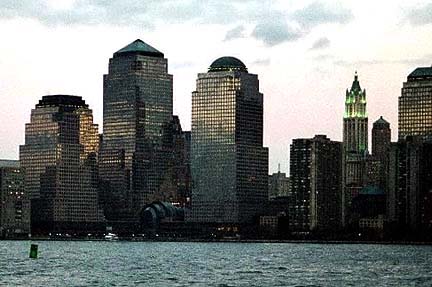
ailing skyline
Safety precautions were in full force for the New Year's Eve celebration. Taxis weren't allowed near Port Authority, so I caught the 'A' train downtown. A middle-aged working man got on and addressed the car.
"This is ridiculous," he said. "They're out there welding down manhole covers. We have to stop somewhere. We can't keep living this way."
I nodded heartily.
"And we haven't even killed as many of them as they have of us yet," he continued. I froze, and stuck my nose in my book.
I had the keys to my friend Jon Babcock's apartment, as he was out of town for the holidays. I went in, to the same place I'd left in early January. My computer was still there, although he had never hooked my printer up. I contemplated the empty skyline from his back window, and thought about fear and anxiety.
Fear, I thought, is largely based in misunderstanding, in the unknown. If you face down a fear, educate yourself about it, or simply recognize it, it becomes less scary. When I thought of taking the Trans-Siberian Railway alone across Russia, I'd originally been apprehensive. Taking a cargo ship alone with a crew of 23 men had sounded scary. The entire continent of Africa has intimidated me, like Central Asia, East Timor, and going to see the Ugandan mountain gorillas in the park where tourists had been massacred less than three years ago. But when I'd been to the places, the fear dissipated, as there had been statistically little to be afraid of. Most people are essentially the same -- trying to get by, to achieve some sort of happiness, and happy to help a stranger. Going around the world at ground level did require a leap of faith in my fellow humans, and they hadn't generally disappointed me. This sounds simplistic, but fear lessens when you face it.

home sweet home
To apply this lesson to today, I knew that a lot of people were afraid of terrorism. Cowering or panicking, like the idiot on the subway said, is no way to live. The point of terrorism is to terrorize. So face it, think about it, and go back to trying to live a better life. It's what New Yorkers have done. Those who opted to remain in the City have been forced to live with fear and terrible memories. Most had become more appreciative of their daily lives because of it. Financial advisors and artists alike had quit attaching so much importance to their work, and started spending more time with their loved ones. They weren't waving flags to lift their spirits. No, they had learned to live every day as if it might be their last. New York, to me, was the only place I understood after having been out of the country on September 11. They had earned the right to their opinions, and I hoped that more people would sit up and pay attention to how New Yorkers were dealing with the aftermath of personal tragedy and public trauma.
It felt weird to be sitting on East Seventh Street, looking at a familiar but unfamiliar skyline. But a year later, after going nearly everywhere and especially after September 11, I could say there was no place like home. New York was still a vibrant, multicultural, cynical but hopeful, fabulous place.
I picked up the phone and ordered delivery pasta, and watched Times Square's New Year's Eve, with all its sealed manhole covers, on television.
EPILOGUE
Back in April, I promised a nice man that I would go to see him in Australia. Michael Tunaley (see "The Race for the Bug-Eating Gold") had been patiently (well, sort of patiently) waiting for me for eight months. I used frequent flyer miles, flew via a stopover in Los Angeles, and showed up in Crystal Creek, New South Wales, on January 19th. As of today, February 15, 2002, I am living in a house he built himself on top of breezy mountain near Murwillumbah. We feed raw meat to the kookaburra birds and I leave mangos for the resident forest wallaby. Michael is a schoolteacher, and is also an excellent chef (Photos are here) It's a good place for me to rest while I write my book proposal, but is not permanent as my visa expires on April 15th. My ticket will return me to Los Angeles, where I will be in Steve and Cat's wedding and will plan my next move.
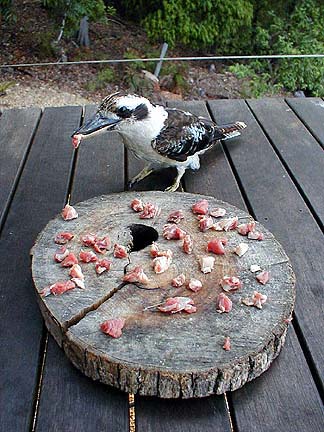
"laugh kookaburra laugh"
Unfortunately, all is not perfect in paradise. I discovered post-journey depression, and moped about. For twelve months, I had a clear-cut goal: Proceed around the world briskly. Now, I was goal-less, homeless, unemployed, and generic. I couldn't even work out how to shop for clothes. Time will hopefully heal this, as racing around the world again doesn't seem like a viable option.
The story on MariesWorldTour.com website has ended with December 31, 2001.

Marie in Oz
--END--
ACKNOWLEDGEMENTS:
Thanks for getting me off the ground and running:
Polly Watson and Al Huckabee, Andy Ball, Kelly, Scott "Pond Scum" Elmer, Warren Ellis, Don Hudson, Kevin Kobasic, Yancey Labat, Julio Herrara, Dan Carr.
Thanks for help along the way:
Shelly Teitelbaum, Nancy Calvert, Richard McConnell, Risa King, Christina Horn, passengers and crew of Direct Kiwi, Oleg Samoylov, Mark Norman, Captain Thomsen of Arktis Atlantic, Mario of Hotel Turismo, Mark Bamford, Julie Davis, Lynne Gawthorpe, Fiona Lawrance, Rob Stellinga, Michael Tunaley, my fellow Intrepid clients, Mrs. Galya, Alti from Mongolian Outback, Dominik and Esther, Oleg from Asia Travel, Helen Fuge, Lena and Masha, Lynn Parramore, BootsNAll.com, Wohn-Agentur Freiraum, Elizabeth Taylor of Footprint Handbooks, Dr. Lillian Mittl and her e-mail dental advice, Captain Martin Gaebe, Chief Engineer Bernd Soehnle, Thandi Lazarus, Crazy Kudu, Shawn Marshall, Thebe River Safaris, Audi Camp, Lars and Carina, Dean from Windhoek's Cardboard Box, Shearwater canoe safaris and Zambezi.com, Bono from Shearwater, Vicki and Mubiana, Emerson and Green hotel, Guerba, Carl from L.A., my fellow Guerba passengers and guides, Paul Franklin, Howard and Sonia Goldfield, Dragoman, Marky Mark, Sammy, Tony, Monica, Claudine, all my fellow Dragoman passengers, Krisztina Glausius of BBC radio, Lisa Ann Williamson, Peter Moore (and for keeping me company in Sydney), Werner Haberzettl of Sudan, Murchison, Pocking and Portsmouth, Hans Isler, Carla Del Barone, Benjamin Russell, Susan McCarley, Stuart Moore, Sarah and Pauli Meyer, Michael Dietsch, Sonia Z, Moira O'Keeffe, Antje Kharchi, Mike Heisler, Susan Broman, Brian Kelly, Jennifer Carman, Greg McElhatton, Karen Bean, Christiana Hart.
Encouragement and support back home:
Peggy, Larry, Elias, and Meadow Fallon, Rachel Chiu, John McCrea, Nikki Hall, Jessica Wolk-Stanley, Brett and Jennifer Sonnenschein, David and Janie Wohl, Marc and Judy Siry, Pete Sheehy, Joey Cavalieri and Connie Hatch, Sal, Dean Haspiel, Josh Neufeld, Mike Heisler, Monica and Dean Kubina, Jim Lee, Jeff Tartakov, Bob Chapman, Randy Lofficier, Dr. Ria Eagan, Dr. Margaret Burns, Jared Osborn, Karen Novak, Andy Newman, Jim and Sue Klima, Karen Arnold, everyone on my mailing list and especially those who wrote back, and Bob Harras (in spite of his printouts of travel horror stories off CNN.com).
Major kudos to those who made my irresponsible abandonment of my life possible:
Linda Javins and Frank Walcroft
Steve and Catherine Buccellato
Marie alice Arnold
Jonathan Babcock
Richard Starkings and John "JG" Roshell